News
-

Marine biologist William Cheung named director of UBC Institute for the Oceans and Fisheries
June 16, 2021
Renowned marine biologist William Cheung has been appointed director of the UBC Institute for the Oceans and Fisheries. The appointment is effective July 1, 2021 through June 30, 2026 with the possibility of an extension. Cheung is an international leader in studying how climate change affects… read more
-

UBC Science researchers receive $7 million in NSERC funding
June 15, 2021
Thirty-three UBC Science faculty members received a total of $7 million in Natural Sciences and Engineering Research Council of Canada (NSERC) Discovery Grants to support long-term research goals for individual researchers for up to five years. This comes from a total of 85 projects across UBC… read more
-
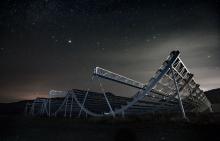
Canadian telescope detects 500 fast radio bursts in a year, quadrupling number of known FRBs
June 9, 2021
The CHIME telescope detected 535 new fast radio bursts during its first year of operation – from 2018 and to 2019 – quadrupling the number of known occurrences of the puzzling pulses of radio energy from far outside our galaxy. Scientists with the CHIME (Canadian Hydrogen Intensity… read more
-

National Research Council of Canada, UBC launch clean energy collaboration centre
June 4, 2021
The University of British Columbia and the National Research Council of Canada (NRC) have launched a Collaboration Centre for Clean Energy Transition, the Government of Canada announced today. The new centre aims to accelerate the development and integration of affordable clean alternatives… read more
-
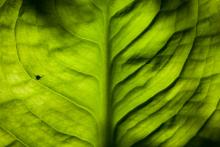
Botanical garden as time capsule: Untangling plants’ potential to sequester carbon
June 3, 2021
A study conducted at two botanical gardens in Canada may help researchers better understand the ability of plant life to act as Earth’s carbon sink, and the ability of plant species to adapt to future environmental pressures. “Nature’s primary means of sequestering carbon relies… read more
-
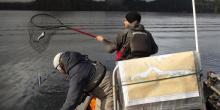
Salmon virus originally from the Atlantic, spread to B.C. wild salmon from farms
May 26, 2021
Piscine orthoreovirus (PRV) – which is associated with kidney and liver damage in Chinook salmon – is continually being transmitted between open-net salmon farms and wild juvenile Chinook salmon in British Columbia waters, according to a new genomics analysis published today in Science… read more
-
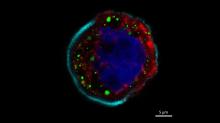
Canadian researchers lead development and testing of promising treatment for COVID-19 variants
May 11, 2021
A new anti-viral drug could improve COVID-19 outcomes and survival rates — and is highly effective against multiple variants — according to a new study led by researchers at the University of British Columbia and Université de Sherbrooke. The drug, called N-0385, blocks the… read more
-

Where should our digital data go after we die? UBC study explores possibilities
May 6, 2021
People want control over what personal digital data is passed along after they die, along with tools to make it easier to do so, according to a new case study by computer science researchers at the University of British Columbia. On the other hand, people found the idea of creating AI-powered… read more
-
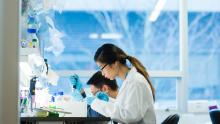
UBC-grown biotech leads global pandemic efforts
April 26, 2021
Millions of Canadians have received the Pfizer-BioNTech COVID-19 vaccine, but what many may not realize is that a key component of the injection was developed right here at UBC. Acuitas Therapeutics, a UBC spin-off company co-founded by Dr. Pieter Cullis, developed the lipid nanoparticle… read more
-

Why so Siri-ous? Striving to create natural voice agents
April 13, 2021
While voice user interface agents like Siri and Alexa are now commonplace, their designers are still striving to make their conversation ever more natural. But what does ‘natural’ mean for a human-agent conversation? A new study by UBC computer scientists investigates what designers… read more